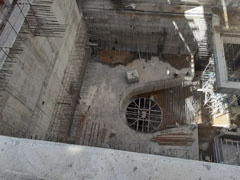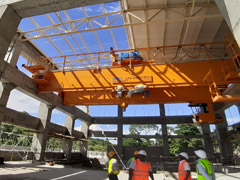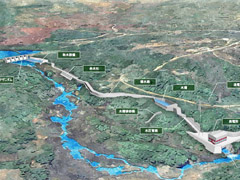A sketch of Malawi - "Prospects and Challenges for the hydroelectric power station construction project in Malawi"
2020.08.31
The Japanese Government is supporting the construction of a hydroelectric power station in Malawi. I want to introduce the background and aims of Japan's support efforts and the electric power condition in Malawi that emerged from the challenges ahead.
Malawi's total electricity capacity, according to the National Energy Policy (2018) of Malawi, is 361 megawatts (MW), 98% of which is hydroelectric energy generated by using the abundant water flowing from Lake Malawi. However, recently, as the water level of Lake Malawi, which is the ninth-largest in the world, has dropped, the amount of power generation has decreased, and this has led to increased frequency of power outage. Therefore, as an one of the quick options to address the problem, the government urgently procured diesel-fired power generation facilities. As a result, the total amount of installed capacity in Malawi reaches about 422 MW. However, in comparison, the total installed capacity is smaller than that of the OkuTadami Power Station (Electric Power Development Co., Ltd.), which boasts the largest installed capctity of 560 MW among Japanese hydroelectric plants. With such limitation of infrastrucutre development in power generation, the current amount of power generation in Malawi does not meet the demand; more than 700 MW is required.
To improve the situation, the Japanese Government, acting on the Government of Malawi's request, decided to take on the Tedzani Hydroelectric Power Station's expansion project in Blantyre District in the south with grant aid. The Tedzani Hydroelectric Power Plant is an old power station that started operation in 1972, and so far, the second and third power generation units have been added within the Tedzani site. The purpose of the project currently underway is to add one more power unit as Tedzani IV with approximately 18 MW to the three operating units. This will bring the power generation at the station to about 102 MW in total. This project is expected to promote the use of renewable energy (hydropower), to improve the stability of electricity supply, and in the future, to contribute to economic and industrial activities in the capital city of Lilongwe and the commercial city of Blantyre where there is massive demand for electricity.
A public power generation corporation, Electricity Generation Company Malawi Limited (EGENCO), was established in 2018 due to recent power sector reforms. Constructing Tedzani IV is a construction project that will remain in the history of EGENCO. EGENCO Chief Executive Officer, Mr William Liabunya said, "I appreciate that Japan is supporting the first major project since its establishment, and I would like to proceed with further power development to improve the electric power situation in this country. When the construction is completed, the installed capacity of power generation will increase by 18 MW, an increase of 4.2% throughout the whole country, which covers 28 times the power consumption of the Queen Elizabeth Central Hospital in Blantyre, which is one of the largest hospitals in Malawi".
Tedzani IV will create hope, but this alone will not solve all of Malawi's electricity challenges. As of 2018, the whole country's electrification rate is about 14.6%, which is at the lower level compared to the average of 45.4% in Sub-Sahara Africa, and in other words, 85% of people in Malawi live without access to electricity. Even for the people with access to electricity, there are currently few alternative generation options, because of the decrease of the electricity amount due to decline of water volume caused by the dry season and drought. To revitalize the economy, promote the industry, operate medical institutions, and stabilize lifelines, it is urgent to secure means that do not affect power generation capacity under natural conditions.
Affordable and stable supply of electricity can reduce production costs and lead to investment. Improving the electrification rate and stable supply of electricity is one of the key challenges to secure the supply of modern energy and improve the quality of life proposed in Sustainable Development Goal 7 (SDG7).Today, because of the COVID-19 pandemic, a steady power supply is required to operate equipment in medical institutions and supply safe water that supports a good sanitary environment. Furthermore, in the so-called new normal world in which we have to live with COVID-19, remote work and remote education are expected to spread.Therefore, electric power that supports highly reliable communications is a basic condition that influences the development of the country under such conditions.
So how should Malawi tackle the challenges? In order to facilitate the development of power sources, the national energy policy aims to make effective use of all kinds of energy, including hydropower, coal, geothermal power, natural gas, solar power, wind power, biomass and others. Since it takes a long time to construct a large-scale power station, it is desirable to consider the optimal power development plan and then consider the energy mix with an eye towards 20 to 30 years into the future. Economic efficiency is also important, and Malawi, where energy resources are not abundant, needs to examine how to utilize pure nationally produced energy and imported energy. Furthermore, according to the International Energy Agency (IEA), the share of renewable energy is expected to increase along with the movement towards decarbonization. By considering such probabilities, it is also necessary to take into account global trends. In addition, it is important to improve the quality of transmission and distribution networks including substations by reducing the loss rate and increasing reliability. Regarding various power facilities, good maintenance can reduce the cost of its life cycle, so efficient and sound management by each electric power company is also essential. I hope that Malawi's power sector's situation will be improved, and the quality of people's socio-economic activities will get better. At the same time, I expect that the talented human resources of the country that contributes to the development of highly economical power facilities will play active roles with engineers in various fields.
31st August, 2020
WADA Yoshikazu,
JICA Malawi Office

Planned location for water turbine

Scenery of Power House construction work

Panoramic view
scroll